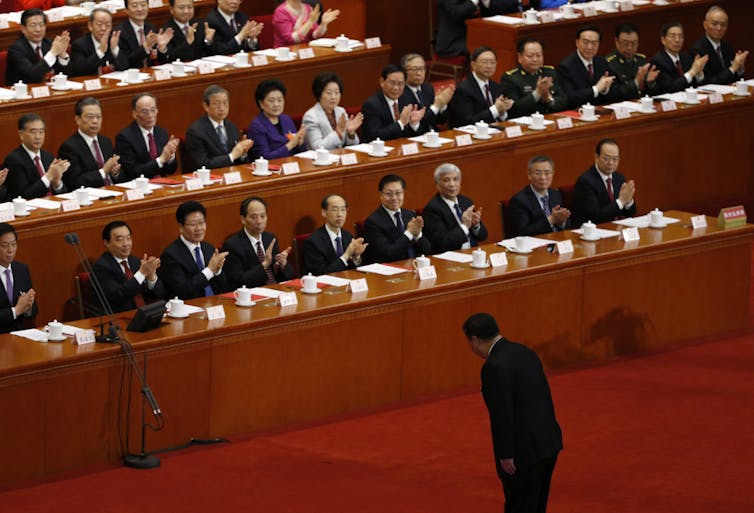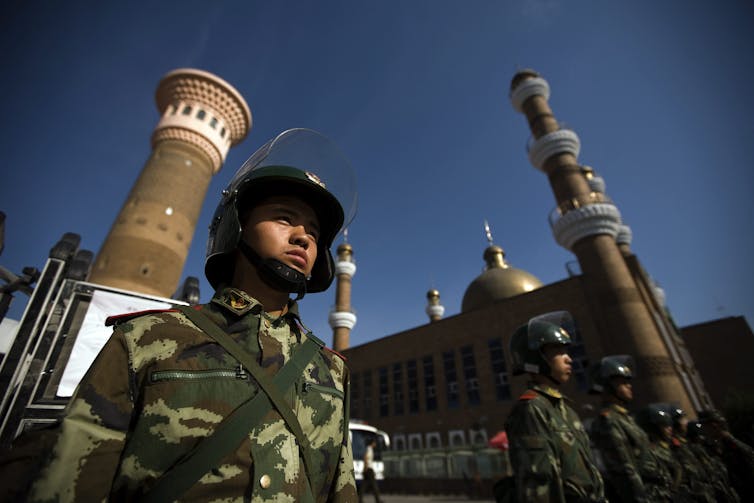why China is 're-educating' Muslims in mass detention camps
- Written by Michael Clarke, Associate Professor, National Security College, Australian National University
China’s Ministry of Foreign Affairs denies their existence. But extensive reporting by international media and human rights groups indicates that upwards of hundreds of thousands of Uyghurs – a Muslim-minority ethnic group – have been detained in sprawling “re-education” centres in the far-western Xinjiang region of China.
The camps are not only massive, with some exceeding 10,000sqm, but have also been likened to prison-like compounds, with “reinforced security doors and windows, surveillance systems, secure access systems, watchtowers, and guard rooms or facilities for armed police”. The US Congressional-Executive Commission on China calls it “the largest mass incarceration of a minority population in the world today”.
China has long been wary of its Uyghur population, particularly in the wake of deadly riots, terrorist attacks and the flow of Uyghur militants to Syria and Iraq to fight with the Islamic State in recent years.
But the emergence of the re-education camps in Xinjiang raises a number of new questions: Why has the Communist Party come to rely on mass internment to control the Uyghurs? What are the implications for China’s future political development under President Xi Jinping? And how should the international community respond?
From social controls to ‘re-education’
Xinjiang’s position at the crossroads of East and West, as well as the cultural, religious and ethnic differences between the majority Han and minority Uyghurs, have posed significant challenges to the Communist Party for decades.
To bring more stability to the restive region, Beijing has pursued an aggressive integration strategy defined by tight political, social and cultural controls, the encouragement of mass migration by the dominant Han Chinese population, and state-led economic development.
In turn, the Uyghurs have increasingly chafed against these restrictive policies, resulting in periodic outbursts of violence.
Read more: What China's censors don't want you to read about the Uyghurs
In recent years, Beijing has leveraged the global war on terror and the existence of a small number of Uyghur militants abroad to crack down on Uyghur ethnic identity even further.
From the party’s perspective, the recent outbreaks of Uyghur violence are not a reaction to restrictive policies, but the result of the “three evil forces” of “separatism, terrorism and extremism”, which have “hoodwinked” ethnic minorities into “erroneous” thinking.
In Xinjiang, this has enabled the development of a high-tech and data-heavy surveillance apparatus to reassert the party’s control over the region, along with efforts to weed out so-called extremists by identifying supposedly “abnormal” activities such as the wearing of long beards, hijabs, niqabs and burkas.
Now, re-education camps have emerged as a repugnant but depressingly logical extension of this process. The government calls them “transformation through education” centres, which harks back to the institutions of “thought reform” established under Mao Zedong in the 1950s.
Those camps sought to “transform” and “rehabilitate” prisoners through such tactics as patriotic indoctrination, self-criticism sessions and forced labour. A similar theme can be seen in the current re-education camps in Xinjiang, where detainees are forced to sing patriotic songs, take part in self-criticism sessions and sit through lectures on Xi Jinping “thought”, Chinese language, Chinese law and the dangers of Islam.
The objective is to dilute Uyghur cultural identity and, in Xi’s words:
enhance their sense of identity with the motherland, the Chinese nation, Chinese culture, the CCP and socialism with Chinese characteristics.
The camps, in fact, represent not only a systematic violation of human rights, but the abject failure of the party’s efforts to integrate Xinjiang and its people into the nation.
A return to core Communist ideology
These camps are an extreme symptom of Xi’s commitment to return Communist ideology to centre stage in China.
This began shortly after Xi assumed the presidency in 2013 when he launched the “Seven Perils” campaign to combat so-called subversive ideas. This targeted things like Western constitutional democracy, universal values of human rights and press freedom.
He also stressed a core lesson learned from the collapse of the Soviet Union - that the system failed because the Communist Party wavered in its ideals and nobody was man enough to resist then-leader Mikhail Gorbachev’s move toward dissolution.
 Xi Jinping has moved to solidify his power since assuming the Chinese presidency in 2013.
Roman Pilipey/EPA
Xi Jinping has moved to solidify his power since assuming the Chinese presidency in 2013.
Roman Pilipey/EPA
To avoid this fate himself, Xi has moved to ensure that political indoctrination should not focus simply on party members, but must be spread throughout society and unite all ethnic groups behind the party’s mission.
Xi has also intensified the party’s obsession with “stability maintenance” to almost paranoiac levels. China has rapidly embraced cutting-edge technologies like facial recognition and artificial intelligence in the pursuit of this objective.
Read more: Xi's indefinite grasp on power has finally captured the West's attention – now what?
Significantly, elements of this system have been in operation in Xinjiang for some time, such as the use of facial recognition scanners at police checkpoints, train stations and petrol stations, and the collection of DNA samples and biometric data from the Uyghur population.
This enables authorities to quickly identify people’s ethnicities and track their physical movements and social interactions both online and offline to determine their relative “threat” to “stability”.
Expansion of surveillance abroad
For Uyghurs, all of this has resulted in an almost unimaginable expansion of the power of the state over their lives in pursuit of what can only be called “cultural cleansing”.
The state’s harnessing of 21st-century technology has also enabled it to harass and silence Uyghurs living abroad and pressure them into collaborating with authorities to monitor family members in Xinjiang.
 Chinese soldier patrolling a mosque in Xinjiang after riots in 2009 left over 150 dead.
Diego Azubel/EPA
Chinese soldier patrolling a mosque in Xinjiang after riots in 2009 left over 150 dead.
Diego Azubel/EPA
As China’s international power and influence continue to rise, there are fears the instruments of coercion perfected in Xinjiang could be used to target other ethnic or religious minorities and dissidents – both inside China and abroad.
Such fears are stoked by the fact that China, and its major tech companies such as Huawei, have begun to ink deals under the “Belt and Road Initiative” (BRI) to export these cutting-edge surveillance technology and systems to a variety of countries, from Zimbabwe to Mongolia.
Read more: Statesman, strongman, philosopher, autocrat: China's Xi is a man who contains multitudes
What does all of this mean for states such as Australia that are increasingly economically interdependent with China?
To begin with, Australia should simply call out Beijing’s actions in Xinjiang for what they are - systematic violations of the human rights of the Uyghur people - much as US Congressional leaders and some members of the European Union have done.
Canberra has done so in the past with respect to the Tiananmen Square massacre and other human rights violations. The scope of the Chinese government’s actions in Xinjiang demands nothing less.
Second, Australian policymakers should recognise that the camps in Xinjiang, and the broader return of Maoist ideology, are arguably a sign of the Communist Party’s insecurity not its strength.
What is occurring in Xinjiang may appear to be far removed from Australia’s national interests, but it provides evidence of the type of behaviour we may come to expect more of from an ascendant China, both domestically and internationally.
In the final analysis, we as a nation should not remain silent while hundreds of thousands of Uyghurs are persecuted for simply being who they are.
Michael Clarke is chairing a panel entitled “Xinjiang: China’s troubled frontier region” at Australian National University on 26 July as part of the ANU China Seminar Series.
Authors: Michael Clarke, Associate Professor, National Security College, Australian National University




